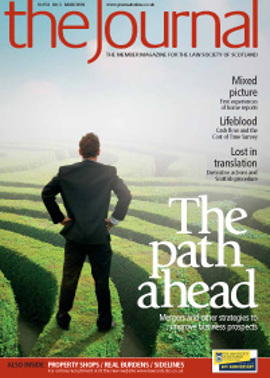Life on the edge

In the January edition of the Journal (p 32) Brian Allingham submitted an interesting article on the survival of small firms in rural locations.
It was read with interest here at Drever & Heddle in Kirkwall, where we have been applying similar policies over a period of years with a view to ensuring the success and succession of the firm.
Several years ago the firm had no plans for the future and little idea of how to make them. The firm was well established and profitable, but it was clear that unless plans were made and put into action, there were going to be serious succession problems.
Drever & Heddle suffered from the same problems that are all too common in many smaller firms, but the principal problem was the recruitment and retention of good staff at all levels.
Systems for growth
First, we recognised that it was imperative to ensure that we were making the most of the staff we had. It was clear that our staff were committed and able, but were we making the most of their talents?
We also knew that our office systems were poor. Such systems as existed were mainly confined to the cashroom procedures, and we were aware of large areas of work which were carried out diligently but in cumbersome ways which differed from solicitor to solicitor and even between staff members.
Systems had to be introduced for all types of work and, recognising the knowledge and skills base of our staff, we decided that consultation had to be the best way forward. We made the decision to consult the staff fully and to involve them at every level of the business, and to help us on the way towards this we began the long journey towards Investors in People recognition, which we achieved last year.
Adherence to the IIPS programme helped to point us in the right direction. It forced us to consult with staff and to introduce formal procedures for all aspects of the work being processed in the office. We recognised that as partners and owners of the business we could write up procedures to suit ourselves, but how much better these procedures would be if we consulted with and gave ownership to the people who actually carried out the work.
Of course there have been problems, and of course systems are not always adhered to, but the difference within the office has been remarkable and the increased productivity levels even more so.
Blame the blame culture
So far so good. Any office is going to work more efficiently with good systems and procedures, but it was the next step which has really made a difference to our firm.
It was when we turned to our people and looked at maximising their contribution while improving their own positions within the workplace, that the real breakthrough took place.
Drever & Heddle had been a blame culture. The blame culture is an unpleasant and dangerous thing. People go to great lengths, not to get their work done, but to protect themselves from others. People hide mistakes for fear of reprisals. People do not enjoy their work, resulting in high staff turnover with all its associated costs and disadvantages.
We set out to change the culture to one where people took ownership of and responsibility for their work. How we achieved this is beyond the scope of this article, but let it be said that some people cannot make the transition. If you go down this route, do not expect universal gratitude! Some people prefer to live in a blame culture where every error is someone else’s fault, rather than to take responsibility for their own actions.
Decision makers
Staff involvement in the running of the business was seen as being imperative to the creation of the new culture and these efficient systems we so needed.
We used staff reviews to listen to our people telling us how to do better, where we needed to invest, and how much more they could do for us if only we would allow them.
We set up monthly staff meetings where the staff discuss the workaday problems which occur in any office, not as a moan session but in a positive atmosphere where people are committed to finding solutions. A partner attends, but has no vote and no voice, other than to answer staff queries or to explain the partners’ views as requested.
The partners have weekly management meetings to discuss the running of the business and to make business decisions as required. The staff were invited to elect a member to attend these meetings, and that staff member has a genuine say in the running of the business.
Partners operate an open door policy so that staff feel they can always discuss problems at any level.
We have a practice manager and are making steady progress to delegate downwards anything that does not require to be done by a partner.
As one management consultant used to say, “Partners should only do what only partners can do”.
One small step…
The case study in the panel is a good example of our improved systems. It relates to the part of our development where we have really made a difference for the future.
We have looked at our people differently. We set out through the process of our reviews to identify training needs and maximise staff potential.
Once you have realised that good staff are hard to find and harder to keep, it is a small step to realising that it makes sense to make the most of the staff you have. In a rural location trained staff are not readily available, so it makes a lot of sense to look carefully at your staff to identify potential, and to train your own people.
This requires a commitment in time and belief on the part of the partners. You really have to believe in what you are doing and to be prepared to become a teacher and a mentor to your staff. As Burns would have it, “A guide, a buckler and example.”
From overhead to asset
At Drever & Heddle we have six fee earners in our Kirkwall office: two partners, one trainee, one solicitor qualified in another jurisdiction, and two paralegals. They are provided with administrative backup from two secretaries and two part time typists. There are other admin staff, but over a period of years we have moved away from the traditional solicitor-typist role model to a model where we have a far higher proportion of our staff generating fee-paying work.
The benefits to the firm are obvious, while the staff benefit from more rewarding and satisfying jobs.
At an early stage in her training we sent our trainee to work for two months with a solicitor in Boston, Massachusetts. There she worked with a sole practitioner who employed a staff of approximately 40. Fee earners were expected to generate their own documentation and admin staff were a rare breed. While we have not achieved anything like this, we are mindful that typists are an overhead whilst fee earners are an asset.
The conversion from typist to fee earner is perfectly possible. Our trainee came to work with us as a typist. She enjoyed the work and the law. We decided with her that she should study and take the Law Society of Scotland exams. The partners supported her by spending time with her in the form of tutorials and directing work of appropriate types to her as she studied. She has now completed her Diploma and will, without doubt, become a very fine solicitor and partner in the firm.
Throughout the period of her training there has never been an opportunity to take on a trainee who would compare with her, so the training has been worthwhile in every sense.
Spot the potential
I have mentioned the filing clerk who is now an executry paralegal. Our other executry paralegal began with us as a typist. At an early stage we identified that she had ability, and directed and trained her towards her present position. We have recently recruited a typist who will become our third executry paralegal.
In our Thurso office we will shortly be starting a trainee. We are also starting a further staff member who has an honours degree in land management and property law. This young lady is starting with us as a pre-Diploma trainee, and will be trained and supported by us through the Society’s exams and the Diploma to become a solicitor.
We are becoming more and more convinced that the way forward is through recruitment of suitable people. Given the right people, the training can follow once they have started with us. Hire for attitude – train for skill.
It is easy to doubt or to scoff at such policies, but they work for us. The benefits of the policy are palpable. The attitude in the office is vastly improved, and the succession of the firm is secure.
Archie Millar is a partner in Drever & Heddle, Kirkwall
IDEAS FROM THE RANKS
Never underestimate the benefits of listening to your staff. A good example, and only one of many good examples we could use, was the suggestion by our filing clerk that we should set out to run a paperless office insofar as we could. She came up with a plan where all incoming mail was scanned in to fee earners’ files on the computer system. Enclosures would be delivered to the fee earner, but the covering letters would be held for 14 days and then destroyed.
Each fee earner has a mailbox for scanned mail. Fee earners simply visit their mailbox and deal with the mail, saving each item to the client file as they go along.
Outgoing mail is done by email wherever appropriate, and no file copies are run off. The person producing the document saves it to the client file.
The system is fantastic and has many benefits. The filing clerk was not made redundant, but was retrained and is now awaiting the result of her final exam in the executry paralegal course. In business terms she converted herself from an overhead to a fee earner and has a far more satisfying and rewarding job as a result.
In this issue
- Thinking ahead
- A line too often crossed
- Big leap forward
- Independence: still viable?
- FAIs: a new lease of life
- ARTL: Turquoise is in the pink
- Summary trials: deciding the facts
- Life at the sharp end
- Conscience and public service
- Wills and ways
- Achieving "senior" rates?
- CPD: the way forward
- Life on the edge
- Pre-action protocol for industrial disease claims
- Fit a doin'?
- Same difference
- Curiosity corner
- System? What system?
- Reviewing appeals
- Testing insolvency
- Scottish Solicitors' Discipline Tribunal
- Website reviews
- Book reviews
- Day of creation
- Lawyer behind the camera
- Homing in on home reports






